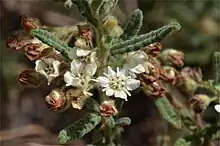| Commersonia densiflora | |
|---|---|
 | |
| In the Australian National Botanic Gardens | |
| Scientific classification | |
| Kingdom: | Plantae |
| Clade: | Tracheophytes |
| Clade: | Angiosperms |
| Clade: | Eudicots |
| Clade: | Rosids |
| Order: | Malvales |
| Family: | Malvaceae |
| Genus: | Commersonia |
| Species: | C. densiflora |
| Binomial name | |
| Commersonia densiflora | |
| Synonyms[1] | |
| |
Commersonia densiflora is a species of flowering plant in the family Malvaceae and endemic to the south-west of Western Australia. It is a dense, low-growing shrub with pinnate, elliptic to narrowly oblong, prominently veined leaves, and white flowers in clusters of 100 or more.
Description
Commersonia densiflora is a dense, low-growing shrub that typically grows to 0.5–1.5 m (1 ft 8 in – 4 ft 11 in) high and 0.5–1 m (1 ft 8 in – 3 ft 3 in) wide, its new growth densely covered with white, star-shaped hairs. The leaves are pinnate, elliptic to narrowly oblong, 15–30 mm (0.59–1.18 in) long and 3–10 mm (0.12–0.39 in) wide on a petiole 3–6 mm (0.12–0.24 in) long with stipules 4–10 mm (0.16–0.39 in) long at the base. The edges of the leaves are rolled under and wavy with irregular teeth, the upper surface has prominent veins, and both surfaces are densely covered with white, star-shaped hairs. The flowers are arranged in dense clusters of 20 to 100 or more on the ends of branches on a peduncle 6–22 mm (0.24–0.87 in) long, each flower on a pedicel 5–20 mm (0.20–0.79 in) long with a bract 2–7 mm (0.079–0.276 in) long at the base. The flowers are 8–15 mm (0.31–0.59 in) wide with five white, petal-like sepals, five pale yellow or white petals with a linear ligule, and a single, densely hairy white staminode between each pair of stamens. Flowering occurs from August to November and the fruit is a hairy capsule 4–5 mm (0.16–0.20 in) in diameter.[2]
Taxonomy
This species was first formally described in 1849 by Nikolai Turczaninow who gave it the name Achilleopsis densiflora in the Bulletin de la Société Impériale des Naturalistes de Moscou from specimens collected by James Drummond.[3][4] In 1876, Ferdinand von Mueller transferred the species to Commersonia as C. densiflora in his Fragmenta Phytographiae Australiae.[5]
The specific epithet (densiflora) means "crowded-flowered".[6]
Distribution and habitat
Commersonia densiflora grows in shrubland and woodland between Mullewa, Kalbarri and Shark Bay in the drier parts of the Avon Wheatbelt, Geraldton Sandplains, Swan Coastal Plain and Yalgoo bioregions of south-western Western Australia.[2][7]
References
- 1 2 "Commersonia densiflora". Australian Plant Census. Retrieved 18 March 2023.
- 1 2 Blake, Trevor L. (2021). Lantern bushes of Australia ; Thomasias & allied genera : a field and horticultural guide. Victoria: Australian Plants Society, Keilor Plains Group. pp. 180–181. ISBN 9780646839301.
- ↑ "Achilleopsis densiflora". APNI. Retrieved 18 March 2023.
- ↑ Turczaninow, Nikolai (1849). "Decas sexta generum plantarum hucusque non descriptorum adjectis descriptionibus specierum nonnullarum". Bulletin de la Société Impériale des Naturalistes de Moscou. 22 (3): 10. Retrieved 18 March 2023.
- ↑ "Commersonia densiflora". APNI. Retrieved 18 March 2023.
- ↑ Sharr, Francis Aubi; George, Alex (2019). Western Australian Plant Names and Their Meanings (3rd ed.). Kardinya, WA: Four Gables Press. p. 180. ISBN 9780958034180.
- ↑ "Commersonia densiflora". FloraBase. Western Australian Government Department of Biodiversity, Conservation and Attractions.